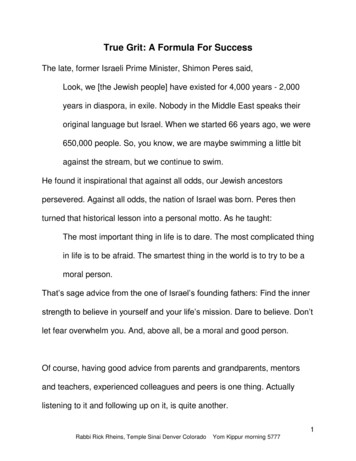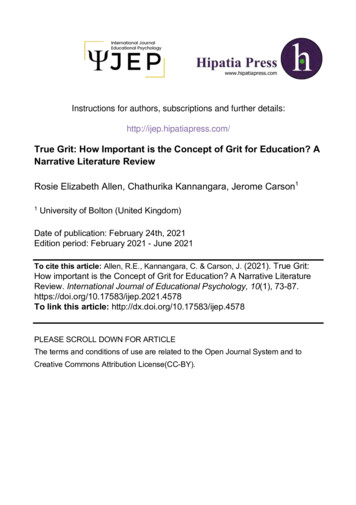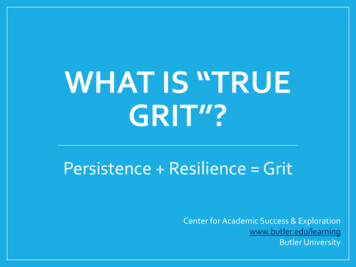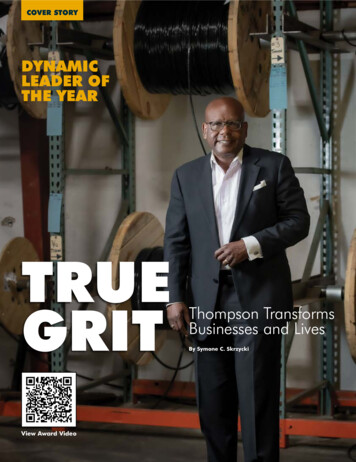
Transcription
True Grit: A Formula For SuccessThe late, former Israeli Prime Minister, Shimon Peres said,Look, we [the Jewish people] have existed for 4,000 years - 2,000years in diaspora, in exile. Nobody in the Middle East speaks theiroriginal language but Israel. When we started 66 years ago, we were650,000 people. So, you know, we are maybe swimming a little bitagainst the stream, but we continue to swim.He found it inspirational that against all odds, our Jewish ancestorspersevered. Against all odds, the nation of Israel was born. Peres thenturned that historical lesson into a personal motto. As he taught:The most important thing in life is to dare. The most complicated thingin life is to be afraid. The smartest thing in the world is to try to be amoral person.That’s sage advice from the one of Israel’s founding fathers: Find the innerstrength to believe in yourself and your life’s mission. Dare to believe. Don’tlet fear overwhelm you. And, above all, be a moral and good person.Of course, having good advice from parents and grandparents, mentorsand teachers, experienced colleagues and peers is one thing. Actuallylistening to it and following up on it, is quite another.1Rabbi Rick Rheins, Temple Sinai Denver ColoradoYom Kippur morning 5777
I’ve heard the following anecdote told in various forms by a great number ofparents and grandparents. It goes something like this: “When my childrenwere young, they thought that I was the smartest person alive. By the timethey were in high school, they thought that I was absolutely clueless. Whenthey were in college they were convinced that I was hopelessly ignorant.But when they graduated and tried to start their careers, all of sudden, Ibecame a genius again!”So the good news is that the younger generation will gain a greater senseof appreciation and admiration for their parents and grandparents who wereable to find a career, establish a family, and provide for their loved ones.The bad news is that they want to move back home! Indeed, the mostrecent studies show that for the first time since 1880, young adults ages 18to 34 are more likely to live with a parent than in any other arrangement.Yes, the younger generations are facing new and very difficult challenges.Therefore, this is not a time to be judgmental and critical. Rather, this is thetime for us to explore ways in which we can be helpful and supportive.This morning of Yom Kippur, we read in the Torah:9You stand this day, all of you, before Adonai your God -- your tribalheads, your elders and your officials, every man, woman and child of2Rabbi Rick Rheins, Temple Sinai Denver ColoradoYom Kippur morning 5777
Israel; even the stranger within your camp, . I make this covenant,with those who are standing here with us this day before Adonai ourGod and with those who are not with us here this day.(Deuteronomy 29)One of the core values of Judaism is the understanding that we have anabsolute responsibility to prepare the younger generations for the uniquechallenges that they and only they will face. We know that the future of ourJewish family is dependent on their success. Of course, “success” canmean different things to different people. Some claim that the ideals ofsuccess vary depending on one’s generation. That may or not be so. Andyet, regardless as to how an individual in one generation or another definessuccess, the question remains: How does one achieve his or her goals?An interesting proposal has been put forth by Dr. Angela Duckworth, aMacArthur Fellow and celebrated author and psychologist. It is a proposalthat has caused quite a stir in the fields of education and sociology. Dr.Duckworth’s research has demonstrated that the most successful studentsare not those with the highest IQs. It has long puzzled researchers whythere is often disconnect between those who learn quickly and easily andthose who succeed at school, business, and relationships. Her quest to find3Rabbi Rick Rheins, Temple Sinai Denver ColoradoYom Kippur morning 5777
the reason for that disconnect has led her to a startling conclusion: thedetermining factor for success is not, as might be commonly assumed, IQ,inherited wealth, physical attributes, or social opportunities. Yes, each ofthose can add positively to a person’s progress. But the primary determinerfor success is, what she calls “grit.” Grit, as she defines it, is the passionand perseverance to achieve long term goals. Again, grit is the passion andthe perseverance to achieve long term goals. Grit is that which keeps aperson going, fighting and striving regardless of the hurdles and setbacks.Grit is that determination not to quit.Like so many logical messages, if you read one of Dr. Duckworth’s articlesor listen to her TED lecture, it is easy to see the wisdom. Well, of course, ifone has grit, if one refuses to quit, more often than not they will succeed.The challenge is in taking that advice, absorbing that wisdom, and actingon it. In addition to the challenge of identifying good and constructiveadvice, we are also confronted with the question: “How does one develop“grit?”The Torah gives each parent and grandparent an important mitzvah:“V’shinantam l’vanekhah, teach your children.” Yes, teach them words of4Rabbi Rick Rheins, Temple Sinai Denver ColoradoYom Kippur morning 5777
Torah and arrange for them to explore the wisdom and inspiration ofJudaism. It also means that we need to teach our children survival skills,street smarts, and that determination to persevere through setbacks.Have we taken the time to share with them that we, too, were scared andunsure when we were just out of school or just starting a job or just fallingin love? We, too, had the panic attacks and moments of doubt as itsuddenly dawned on us that we didn’t have a clue as we were about to getmarried or just about to start a family or struggling how to make a living.V’shinantam l’vanekhah, teach your children.Do they know, have we taught them the difference between lust,infatuation, love, and the kind of LOVE that one feels when you can’tfathom going on your life’s journey without that person in your life?Do they know, have we taught them that yes, we also struggled to find theright career path? A generation ago, the average adult counted 3-6 jobsalong their career path. Modern adults often double that number. It’sirrelevant to label that phenomenon good or bad. It is simply the modernreality. Jobs come and go. Opportunities arise and one either jumps to takeadvantage of them or not. The key is: do we provide our children andgrandchildren a safe and creative sounding board for them to brainstorm?5Rabbi Rick Rheins, Temple Sinai Denver ColoradoYom Kippur morning 5777
Again, that is a far cry from telling them what you think they should do.Rather, a brainstorming session allows us to consider new possibilities,gain perspective and sharpen our analytic skills. V’shinantam l’vanekhah,teach your children:Do they know, have we taught them our knowledge and experiences ofbest business practices, professionalism and work ethic? If you have held ajob, hired others for a job, fired others from a job, we need to teach ourchildren and grandchildren the characteristics and habits for success.Teach them how to respond to a boss. Teach them how to address a client.Teach them how go the extra mile so that the company or firm values them.Teach them how to muster through exhaustion and stress in order tocomplete an important task. Jobs are by nature hard. That’s why they’recalled jobs. We need to help our kids acquire the best practices for theworkplace.Do they know, have we taught them, have we demonstrated for them, howto listen, to hear not just the words but also to note the feelings behind thewords; to hear concerns and not get defensive; to deeply listen beforeprocessing a response?Do they know, have we taught them how to win with grace, how to lose withgrace, how to learn from failure?6Rabbi Rick Rheins, Temple Sinai Denver ColoradoYom Kippur morning 5777
And finally, do they know, have we taught them how to persevere, how toovercome failure and disappointment and the occasional unfairness of life?Have we taught them how to develop grit?As I mentioned earlier, Dr. Duckworth’s research points to grit as thenumber one quality determining success. And while at first glance it mayseem all but impossible to teach, I believe that we need only to point to theheroic history of our people.Of all the extraordinary gifts of the Jewish people, at the core is ourlegendary tenacity, our will to survive, to thrive, to create, and to improveourselves and the world around us. The history of our people providesendless examples of our indomitable will. We learned how to survive andpersevere because we believed that life, progress and the continuinglegacy of our family, our faith and our spirit was worth it. The Jewish peoplehave witnessed the rise and fall of countless nations and cultures. Theempires of the Egyptians, the Assyrians, the Hittites, the Babylonians, thePersians, the Greeks, the Romans, the early Islamic imperialists, theCrusaders, the Mongol invasions, the Ottoman Empire, and the German7Rabbi Rick Rheins, Temple Sinai Denver ColoradoYom Kippur morning 5777
Nazi threat all dominated vast parts of the world, all brought oppressionand bigotry to Jews. That we survived is a miracle which baffles historiansand anthropologists. So many other cultures and tribes have disappeared.Why did the Jews survive?From defeat to exile to persecuted minorities forced into ghettos anddenied the most basic and fundamental rights in both Christian Europe andthe Muslim Middle-East, how did we survive? And not just survive. Indeed,how did we get to this moment, lazman ha-zeh, this point in the history ofcivilization, where Jews have had such success and achievements well outof portion to our population? The statistics are relatively well-known but stillremarkable. Though Jews currently make up only 0.2% of the world'spopulation at least 22% of all the Nobel Prize winners are Jews and thoseof Jewish ancestry. We constitute 36% of all the prize winners from theUnited States. In the scientific research fields of Chemistry, Economics,Physics, and Physiology/Medicine, 26% of the recipients were Jewish. Ofthe organizations that were awarded the Nobel Peace Prize, 22% werefounded principally by Jews. And lest you think that those numbers areinflated only due to the greatness of past generations, since the turn of thecentury (i.e., since the year 2000), Jews have been awarded 25% of all8Rabbi Rick Rheins, Temple Sinai Denver ColoradoYom Kippur morning 5777
Nobel Prizes and 28% of those in the scientific research fields. In just aboutevery field of human achievement, medicine, science, business, education,law, and entertainment, a significant percentage of the top leaders areJewish.Scholars speculate as to the reason why. Certainly our emphasis on highereducation and literacy plays a huge part. Let’s face it, Jewish kids begintheir teenage years learning how to lead a Shabbat service. They read froma Sefer Torah and deliver a thoughtful lesson to peers and adults. Our loveof learning, critical analysis and debate have been honed and nurtured forthousands of years. Jews are also instinctively iconoclastic, challenging oldassumptions and popular myths. Surely, all of these cultural and spirituallegacies play a significant role in the remarkable achievements of ourpeople. But none of those characteristics would be sufficient if it were notfor a strong will-power to carry on, to persevere, and to fight throughadversity and setback. You need grit to survive. You need grit to succeed.And this absolute determination to live, to grow, to experience and embracelife is at the very heart of what it means to be a Jew.9Rabbi Rick Rheins, Temple Sinai Denver ColoradoYom Kippur morning 5777
This grit, this determination, this preparation for excellence rests on thefoundation of Judaism’s three pillars: God, Torah and Israel, or if you will:Spiritual Strength, Wisdom, and a Love of family and community. SpiritualStrength is the realization that life is not defined or confined by theempirical. We are more than flesh and blood. There is intrinsic and exaltedpurpose, meaning and value to life. Torah can be understood in thebroader sense as Wisdom. In the Talmud, Wisdom includes those skillsthat enhance and enrich ones’ life. This includes an appreciation for criticalanalysis and the search for truth. It also includes such life-saving skills asproper hygiene and teaching our children how to swim. Wisdom, at itsessence, is the street-smarts to survive. And, Israel, the final pillar of thetriumvirate, means both Israel the people and Israel the land. We fulfill thisby teaching our children and grandchildren about the heroic story of theirancestors, the tenacity and courage of their Jewish family, the nurturingwarmth of our Jewish community. It means that we form synagogues andorganizations to help each other. As it is written in the Talmud (Shevuot 39a),Kol Yisrael arevim zeh bazeh, All the people of Israel are responsible forone another.10Rabbi Rick Rheins, Temple Sinai Denver ColoradoYom Kippur morning 5777
The secret of our survival and the tremendous success of our people is notso secret. It is well known. Success is not a mystical gift. Neither is thecontinued success and survival of our Jewish family to be taken forgranted. Rather, our survival and continuing success has to be earnedthrough a commitment to learn, teach and engage the Jewish gifts of spirit,of mind and of the heart. Success is achieved by a determination not to quitwhen things get rough. A hundred generations of our people haveembraced and lovingly taught and nurtured these exalted qualities in thehome and the synagogue. Now it is our turn!In this New Year 5777, let us renew our commitment to teach life’s lessonsto our children and grandchildren. Teach them about the history and thetenacity of our Jewish people and your personal family’s journey. Inspire inthem the life lessons that will help them navigate through difficult times.Nurture them and help them strengthen their skills and determination andpassion for life. They are our future. Let us help them make that futurebright and good.11Rabbi Rick Rheins, Temple Sinai Denver ColoradoYom Kippur morning 5777
True Grit: A Formula For Success The late, former Israeli Prime Minister, Shimon Peres said, Look, we [the Jewish people] have existed for 4,000 years - 2,000 years in diaspora, in exile. Nobody in the Middle East speaks their original language but Israel. When we started 66 years ago, we were 650,000 people.










